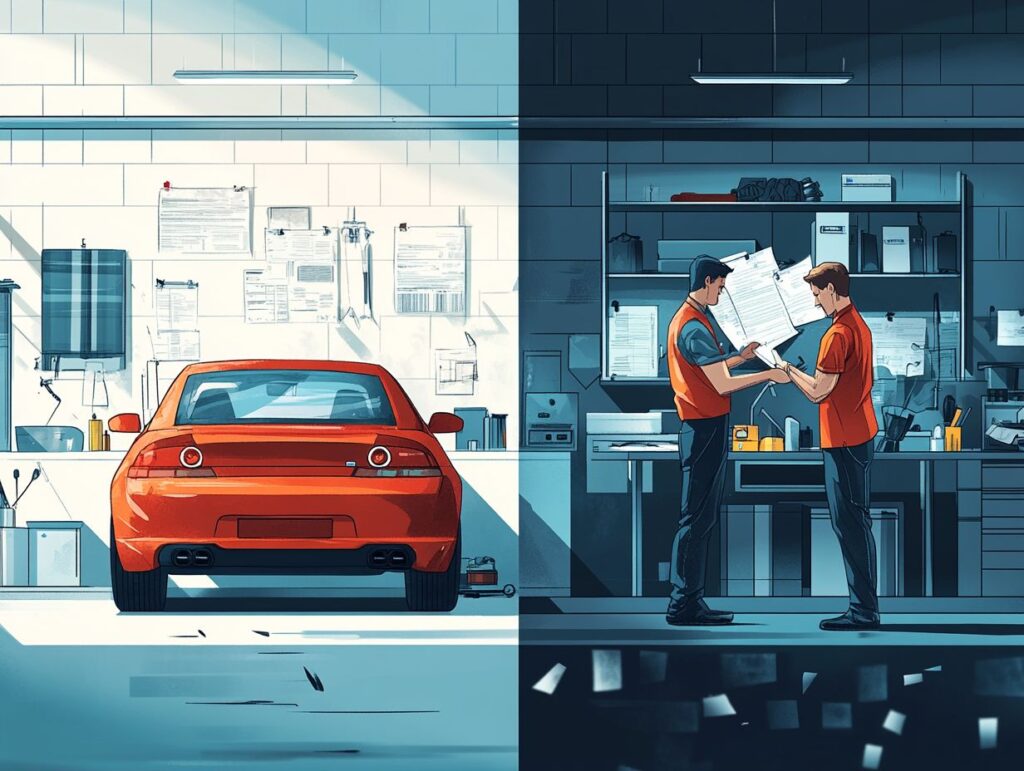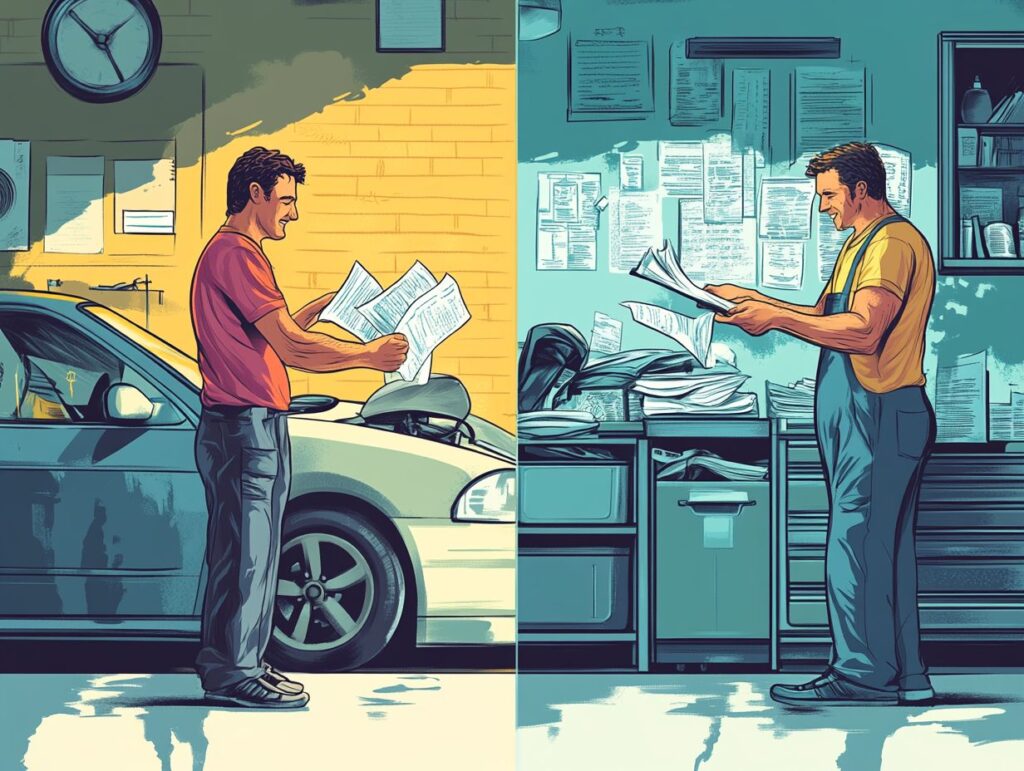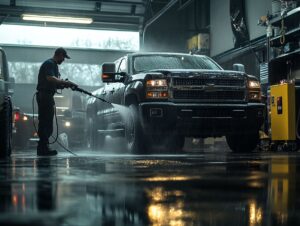
Starting an auto detailing business can be an exciting opportunity, but selecting the appropriate business structure is essential for achieving success. A sole proprietorship is one of the simplest and most common forms of business ownership, presenting both distinct advantages and challenges.
This guide will delve into what a sole proprietorship involves, highlighting its defining characteristics, as well as the benefits and drawbacks specific to the auto detailing industry. Additionally, it will address key considerations for aspiring entrepreneurs. Whether you are looking to benefit from lower start-up costs or navigate potential liabilities, this information will assist you in making an informed decision.
Advantages of a Sole Proprietorship for Auto Detailing Business

One of the most attractive features of starting an auto detailing business as a sole proprietorship is the numerous advantages associated with this business structure. These include lower startup costs and the ability to keep all profits earned from your hard work.
Entrepreneurs benefit from having complete operational control, which means they can design their marketing strategies and service offerings without outside interference. This autonomy can greatly improve customer relationships and enhance client satisfaction.
Lower Start-up Costs
Starting an auto detailing business as a sole proprietorship typically involves lower startup costs compared to other business structures, making it an appealing choice for aspiring entrepreneurs. This approach can significantly alleviate the financial strain that often accompanies launching a new venture.
For example, with minimal investment in equipment, new owners can direct their funds toward high-quality supplies instead of costly machinery, thereby optimizing their operational efficiency. Additionally, reduced liability insurance premiums can further decrease overhead costs, allowing entrepreneurs to concentrate more on meeting customer needs.
As a result, these financial savings contribute to improved cash flow management, enabling business owners to reinvest profits back into their operations and uphold financial responsibility.
This supportive cash flow, in turn, fosters sustainable growth by facilitating better resource allocation and creating development opportunities.
Complete Control and Flexibility
One of the notable advantages of a sole proprietorship is the complete operational control it provides, enabling owners to make swift decisions that can improve customer retention and service quality.
This degree of autonomy not only promotes an agile decision-making process but also allows entrepreneurs to adjust pricing strategies and service offerings based on immediate market feedback and customer preferences.
For example, when a proprietor observes a change in customer demand or identifies emerging trends, they can quickly modify prices or introduce new services without the need for bureaucratic approval.
This level of responsiveness can significantly enhance customer engagement, as clients feel that their needs are being acknowledged and addressed in real-time.
As a result, this proactive approach to decision-making can foster stronger customer loyalty and provide a competitive advantage in the marketplace.
Simple Tax Filing Process

One of the significant advantages of a sole proprietorship is the straightforward tax filing process. The income generated by the auto detailing business is typically reported on the owner’s personal tax return.
This streamlined approach not only simplifies bookkeeping for the owner but also provides an easier way to track profits and losses, facilitating more effective financial planning.
However, while income tax reporting may be uncomplicated, it is crucial for the owner to remain aware of the self-employment tax, which can have a notable impact on net earnings.
This tax is applied to the owner’s profits and contributes to Social Security and Medicare. Understanding how self-employment tax interacts with personal income tax obligations is essential for crafting a sound business strategy that preserves the owner’s hard-earned income.
Thus, achieving a balance between these financial considerations is vital for maintaining profitability and promoting long-term growth.
Disadvantages of a Sole Proprietorship for Auto Detailing Business
Operating an auto detailing business as a sole proprietorship certainly offers numerous advantages, but it is important to also acknowledge the significant disadvantages that aspiring entrepreneurs should carefully consider.
One major concern is the issue of unlimited personal liability, which means that personal assets could be at risk if the business faces challenges. This aspect can complicate matters, especially when trying to secure funding for expansion or navigating potential legal issues.
It’s essential for anyone considering this path to weigh these factors thoughtfully.
Unlimited Personal Liability
One of the most significant drawbacks of a sole proprietorship is the issue of unlimited personal liability. This means that the owner’s personal assets could be at risk if the business incurs debts or faces lawsuits.
This situation can have a profound impact on personal finances, as it may lead to the loss of one’s home, savings, or other personal belongings should the business experience financial difficulties or legal challenges.
The potential for severe financial consequences highlights the importance of implementing effective risk management strategies. For individuals operating a sole proprietorship, obtaining adequate liability insurance is essential, as it provides a protective buffer that can help shield personal wealth from business-related risks.
Without such coverage, individuals might find themselves grappling with crippling debts and a reduced sense of financial security. Therefore, it is crucial to prioritize comprehensive insurance policies that align with their financial responsibility goals.
Difficulty in Raising Funds
Sole proprietors often encounter challenges when it comes to raising funds for their auto detailing business. Lending institutions may perceive them as higher-risk borrowers due to their personal liability, which can create significant obstacles not only in securing loans but also in negotiating favorable terms that are essential for business growth.
Without adequate funding, the owner may find it difficult to invest in necessary equipment or marketing strategies that could enhance visibility and attract more clients. In such situations, financial planning becomes a crucial tool, allowing the entrepreneur to map out cash flow, budget expenses effectively, and present a well-organized plan to potential lenders.
Additionally, exploring alternative funding sources, such as crowdfunding or small business grants, can help address traditional funding challenges, enabling the owner to establish a more resilient financial foundation.
Personal and Business Finances are Intertwined
In a sole proprietorship, personal and business finances often become intertwined. Therefore, it is essential for owners to maintain accurate accounting practices to distinguish personal expenses from business expenses.
This separation is not only crucial for the overall financial health of the business but also simplifies the tax filing process.
By implementing sound accounting practices, such as regularly tracking income and expenses, business owners can avoid the pitfalls of co-mingling funds, which can lead to inaccuracies and potential legal complications.
Establishing clear financial boundaries facilitates more straightforward audits and tax returns, ultimately reducing stress during tax season.
Utilizing tools like dedicated business accounts, accounting software, and well-defined budgets can significantly enhance financial management.
This approach ensures that the proprietor remains compliant with tax regulations while maximizing the business’s profitability.
Factors to Consider Before Choosing a Sole Proprietorship

Before deciding to operate an auto detailing business as a sole proprietorship, it is important to carefully consider several factors, such as personal risk tolerance, legal implications, and plans for future business expansion.
By understanding these elements, entrepreneurs can make informed choices that align with their financial goals and overall business objectives.
Assessing Personal Risk Tolerance
Assessing personal risk tolerance is an important step for anyone considering a sole proprietorship, as it helps determine the level of financial responsibility one is willing to accept. Understanding this concept allows potential entrepreneurs to evaluate their comfort with uncertainty while navigating the often unpredictable world of business ownership.
For example, in the auto detailing industry, individuals must carefully consider the risks related to fluctuating demand, potential vehicle damage, and the chance of unexpected expenses, all in relation to their financial objectives. A higher risk tolerance may lead one to invest in advanced equipment or innovative marketing strategies; however, it is crucial to recognize how such decisions could affect overall financial health.
Ultimately, comprehending the intricacies of risk tolerance not only influences decision-making but also lays the groundwork for sustainable growth and success in a competitive market.
Understanding Legal and Tax Implications
Understanding the legal and tax implications of operating as a sole proprietorship is essential for maintaining regulatory compliance and ensuring smooth business operations. This knowledge not only protects the business from potential legal challenges but also sets the stage for long-term success, particularly in the competitive auto detailing industry.
Sole proprietors should be informed about the necessary licenses and permits, which can vary by location but generally include:
- Business licenses
- Sales tax permits
- Possibly health or environmental permits
Additionally, tax registrations are equally important, as sole proprietors must accurately report income and expenses, including self-employment taxes.
By fulfilling these obligations and keeping meticulous records, business owners can reduce risks and concentrate on providing high-quality services that meet the needs of their customers.
Considering Future Growth and Expansion Plans
Considering future growth and expansion plans is essential for any entrepreneur, as these factors will significantly influence the choice of business structure and operational strategies.
It is important to understand how various business structures—such as sole proprietorships, partnerships, LLCs, or corporations—can support scalability, particularly in the auto detailing industry. This sector requires a level of flexibility to adapt to increasing customer volumes and the introduction of new service offerings. For example, selecting a structure that facilitates the easy addition of employees or capital investment can greatly enhance operational effectiveness and customer satisfaction.
Entrepreneurs should take the time to carefully evaluate the tax implications, liability protection, and regulatory requirements associated with each option. Ultimately, making well-informed decisions will lay the groundwork for sustainable growth and provide a competitive advantage in a dynamic market.
Frequently Asked Questions
What are the advantages of a sole proprietorship for an auto detailing business?

One of the main pros of a sole proprietorship is that it is easy and inexpensive to set up, as there are no legal or registration fees. Additionally, the owner has complete control over all business decisions and profits.
What are the potential downsides of a sole proprietorship for an auto detailing business?
The main con of a sole proprietorship is that the owner is personally liable for all business debts and obligations. This means their personal assets may be at risk if the business faces financial trouble or legal issues.
How does a sole proprietorship affect taxes for an auto detailing business?
In a sole proprietorship, the owner reports all business income and expenses on their personal tax return. This can simplify tax filing, but it also means the owner is responsible for paying self-employment taxes, which can be higher than other business structures.
What are the benefits of being the sole decision-maker in an auto detailing sole proprietorship?
Having complete control over business decisions can be advantageous for an auto detailing business, as the owner can make decisions quickly and implement changes without needing approval from others.
How does a sole proprietorship affect the business’s image and credibility in the auto detailing industry?
Some customers may view a sole proprietorship as less professional or established compared to other business structures. This can affect the credibility of the business and may make it harder to attract certain clients or contracts.
What happens to a sole proprietorship if the owner wants to sell or retire from the auto detailing business?
In a sole proprietorship, the business is tied to the owner’s personal identity and cannot be easily transferred or sold. This can make it challenging to pass on the business to a new owner or to sell it for a profit.
The AutoPros.online team is dedicated to bringing you high quality automotive content for professionals and car enthusiasts, with topics like auto detailing, performance modifiations, repairs and automotive news.



